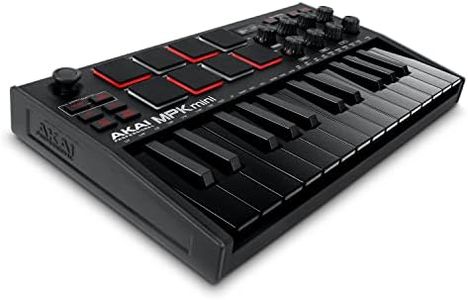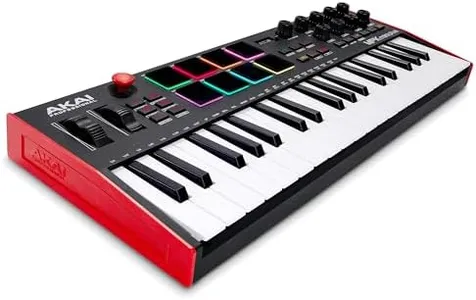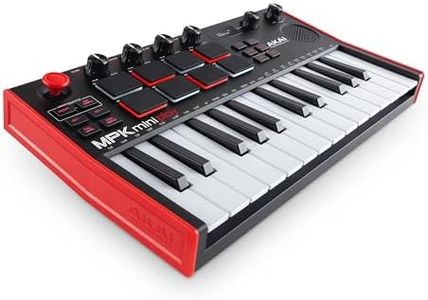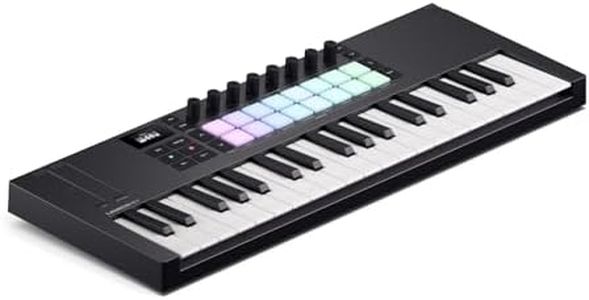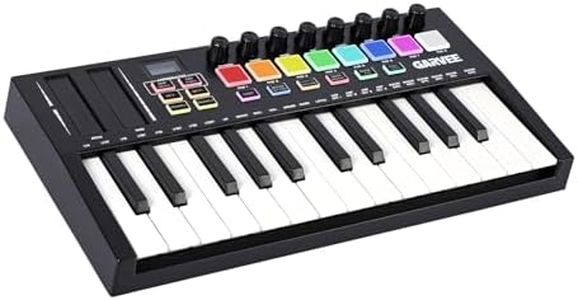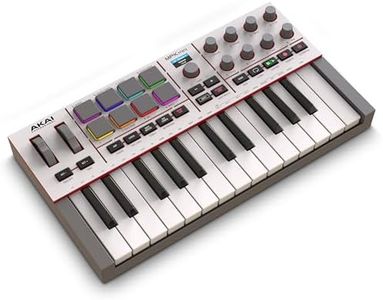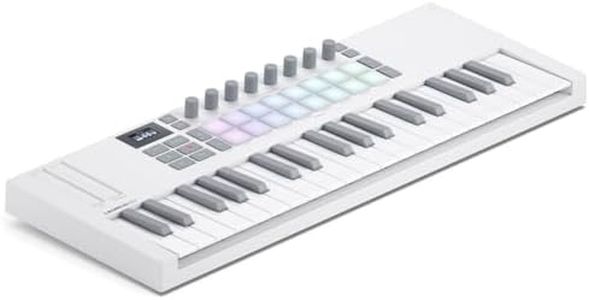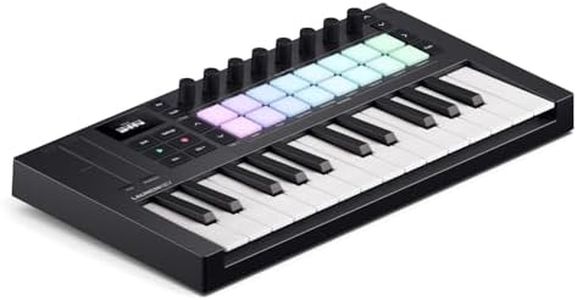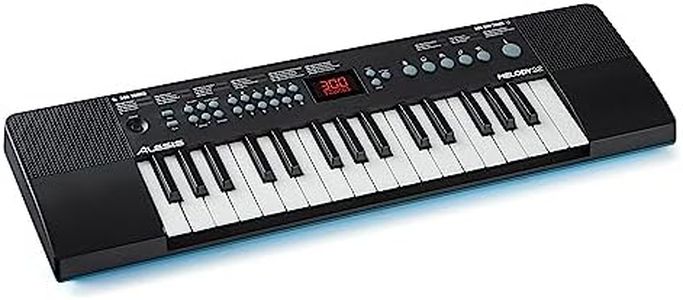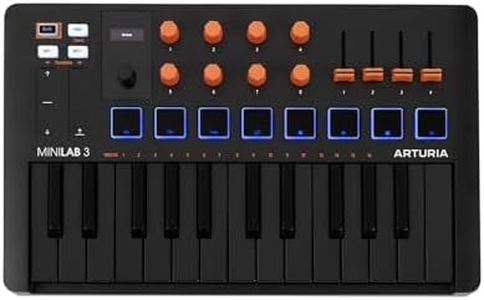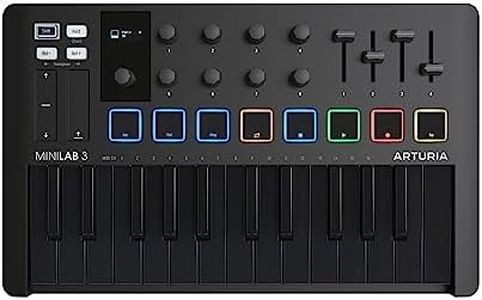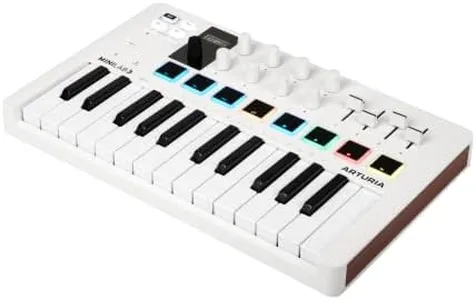10 Best Mini Midi Keyboards 2026 in the United States
Our technology thoroughly searches through the online shopping world, reviewing hundreds of sites. We then process and analyze this information, updating in real-time to bring you the latest top-rated products. This way, you always get the best and most current options available.

Our Top Picks
Winner
Akai Professional MPK Mini MK3-25 Key USB MIDI Keyboard Controller With 8 Backlit Drum Pads, 8 Knobs, Music Production Software and Native Instruments Sound Package (NKS Integration), Black
Most important from
30155 reviews
The AKAI Professional MPK Mini MK3 is designed to meet the needs of musicians and producers looking for a compact and versatile mini MIDI keyboard. With 25 velocity-sensitive keys, it offers a satisfying playing experience, especially for those creating electronic music. The small size makes it perfect for traveling musicians or home studio setups where space is limited. The inclusion of 8 backlit pads is a great strength, allowing for dynamic beat-making and sample triggering, which is essential for modern music production. The built-in arpeggiator and customizable knobs provide further control over your sound, making it a solid tool for creativity.
On the downside, the mini keys may not be suitable for everyone, particularly those accustomed to full-sized keyboards who might find them cramped. The build quality, while decent, is primarily plastic, which might concern users looking for a more robust construction. Additionally, while it comes with music production software and a month of Splice, those looking for more advanced features may feel somewhat limited without buying additional plugins or software.
In terms of connectivity, it operates via USB, simplifying the setup and making it compatible with most laptops and digital audio workstations (DAWs). It's a plug-and-play device, which is great for beginners. Despite its few drawbacks, the MPK Mini MK3 stands out as an excellent entry-level option for aspiring music producers and beat makers, combining functionality and portability effectively.
Most important from
30155 reviews
Akai Professional MPK Mini Plus - USB MIDI Keyboard Controller with 37 Mini Keys, 8 MPC Pads, Sequencer, MIDI/CV/Gate I/O, Music Production Software and Native Instruments Sound Package
Most important from
1934 reviews
The Akai Professional MPK Mini Plus is a compact MIDI keyboard controller with 37 mini keys, offering three full octaves which is great for portability while still allowing a good range for melodies and chords. The keys are velocity-sensitive, meaning they respond to how hard you press, which helps convey expression in your playing. It does not include aftertouch, which some advanced players might miss for additional control.
One standout feature is the advanced connectivity options. It supports USB connection for easy plug-and-play with your computer, plus MIDI and CV/Gate outputs, letting you connect to a wide range of gear including modular synths and external sound modules—this is quite rare in mini keyboards and useful if you want to expand your setup. The MPK Mini Plus also comes with 8 responsive RGB pads, perfect for finger drumming or triggering samples, along with 8 assignable rotary knobs that let you tweak effects or mixer levels without needing to use a mouse. This hands-on control is great for music production and live performance. Additionally, it features a 64-step sequencer that can be used without a computer, allowing you to compose beats and melodies directly on the device.
Build quality is solid for its size, designed to handle regular use. The inclusion of pitch and modulation wheels adds expressive control that many mini keyboards lack. Plus, it comes bundled with MPC Beats software and a Native Instruments sound package, giving you plenty of sounds and tools to get started. The Akai MPK Mini Plus is a versatile, well-rounded mini MIDI keyboard that suits beginners and intermediate producers who want portability, extensive connectivity, and hands-on controls. Although it does not have aftertouch, its included features and software make it a strong choice in this category.
Most important from
1934 reviews
Roland GO:KEYS 3 Music Creation Keyboard | 61-Note Keyboard | Built-In Stereo Speakers | Bluetooth Audio/MIDI Support for Music Streaming - Turquoise
Most important from
175 reviews
The Roland GO:KEYS 3 is a versatile 61-note keyboard designed for music enthusiasts of all skill levels. Its compact size makes it a great choice for beginners and those with limited space. The keyboard's touch sensitivity adds expressiveness to your playing, though it lacks aftertouch, which might be a drawback for more advanced users.
With over 1000 sounds from the ZEN-Core engine and 200 music styles for auto-accompaniment, it offers a rich palette for creativity. The built-in stereo speakers allow for immediate playing without additional equipment, and Bluetooth connectivity enables music streaming and MIDI support, enhancing flexibility for both practice and composition sessions. USB connectivity further allows integration with computers and mobile devices, making it suitable for modern music production needs.
The inclusion of a 3.5mm headphone jack ensures quiet practice sessions, and the option for battery power means you can play anywhere. However, at nearly 10 pounds, it's not the lightest option for those seeking extreme portability. The build quality is robust, typical of Roland products, but the turquoise color might not appeal to everyone's taste. The Roland GO:KEYS 3 is an excellent choice for beginners and hobbyists looking for an easy-to-use keyboard with a wide range of sounds and modern connectivity options.
Most important from
175 reviews
Buying Guide for the Best Mini Midi Keyboards
When choosing a mini or midi keyboard, it's important to consider how you plan to use it. Whether you're a beginner looking to learn, a producer needing a portable option, or a professional seeking a versatile tool, understanding the key specifications will help you make the best choice. Here are the key specs to consider and how to navigate them.FAQ
Most Popular Categories Right Now
